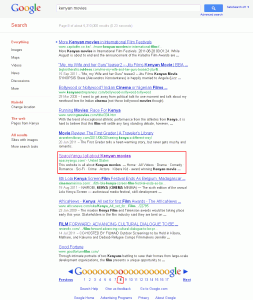You guys remember our very recent project in Kenyan movies? We thought we’d share everything that we’re doing for the site – it will be more fun that away, ama? Also, hopefully one of our Like Chapaa readers can learn something. What follows, therefore, is a discussion on how we’re trying to market the site through search engine optimization.
Now, one of the best ways to get visitors to your website is to ensure that when people search on Google, they find you. For us, we want people to find us when they google “Kenyan movies”.
The SEO Strategy
Step one was to estimate the expected traffic using the Google Adwords Keyword tool. This tool gives an estimate of how many people search for a particular word/phrase on Google every month. It can be used to estimate how many people you can expect to be searching for your website. The tool also gives you ideas on other key words and phrases that are related and which you should/could also target.
We found that about 8,100 people search for “Kenyan movies” on Google every month. Now, this is an extremely small number. This could mean that very few people are interested in Kenyan movies (which is probably true). This is just sad for our movies industry. Sigh.
However, this can be viewed more positively a such: it is probably going to be quite easy (relatively) to dominate this keyword on Google and get to the number one spot in the search results pages.
Also, there are other related keywords/phrases such as free kenyan movies online, kenyan movie stars, kenyan movies online, kenya tv, kenya video and so on. Collectively these push the number of monthly searches to well over 50,000. A good figure – yes?
So the strategy for us would be to dominate search results for “Kenyan Movies” and then target the other keywords one by one.
What happens when you are at number one in the search results pages? It is important to be number one because the site listed at number on in Google search results usually gets upwards of 90% of the people who search. For example, if we rise to number one for “Kenyan Movies” we should expect 16,200 visitors (90% of 18,000) to our website every month. If we rise to number one in the search results pages for multiple keywords/phrases then our site’s visitors increase dramatically. For free. This is, indeed, the power of SEO (search engine optimization) for your website. You can get tens of thousands of targeted, relevant visitors to your website for free.
The Situation So Far
We launched the website www.spaceyangu.com on October 2, 2011. Today is October 5, 2011. Before October 2, if you searched for “Kenyan Movies” you would have no hope to find SpaceYangu because, well, we did not exist.
We’re happy to announce that if you search for “Kenyan Movies” today, you will find us on page 8 of the search results. This puts our website at Number 76 out of 5,310,000 others. Of course our strategy is to get to number one but getting to 76 out of 5 million is pretty good for three days’ work, I think. Here’s a screenshot for proof:
Along the way, we found a competitor! Sinema.co.ke is a website that is also about Kenyan movies as well as other forms of Kenyan entertainment. It is always good to find competitors as it validates what you are trying to do. We’re confident that through SEO alone, we can outdo sinema.co.ke. 🙂 Actually, in fact, at Number 76 in the search results, we’re already better than this site. (I say this full of respect for them, of course).
Some of you may be wondering how we improved our SEO so fast. We’re honestly not quite sure ourselves. I think it is because this is not a very competitive search term. What we did, though, is fully documented here. Please read that. You will learn that SEO is all about relevance and authority. So, for us, the strategy is 1)to make sure that our websites is as relevant to “Kenyan Movies” as possible and 2) to get as many other websites to link to SpaceYangu.com as possible. It is going well so far. Let us see how long it will take to get to Number 1. Wish us luck!!
We intend to document everything we can about how we’re building up SpaceYangu. If there is anything specific that you want to know, please leave a comment below.
PS: You can Hire Us if you want us to do SEO for your own website.

 Over the years, we’ve worked with very many people and many, many small businesses. I it’s always interesting to see how a small business is run and how the owner approaches it. I was thinking about this today, and I realised there are two types of small business owners: hard workers, and smart workers.
Over the years, we’ve worked with very many people and many, many small businesses. I it’s always interesting to see how a small business is run and how the owner approaches it. I was thinking about this today, and I realised there are two types of small business owners: hard workers, and smart workers. Facebook.com is currently valued at $15 BILLION! That makes the young founder, mark Zuckerberg an extremely wealthy man at such a young age. What about you? How are your finances doing? You could seethe with envy at Mark, or you could try your own hand at making money online!
Facebook.com is currently valued at $15 BILLION! That makes the young founder, mark Zuckerberg an extremely wealthy man at such a young age. What about you? How are your finances doing? You could seethe with envy at Mark, or you could try your own hand at making money online!